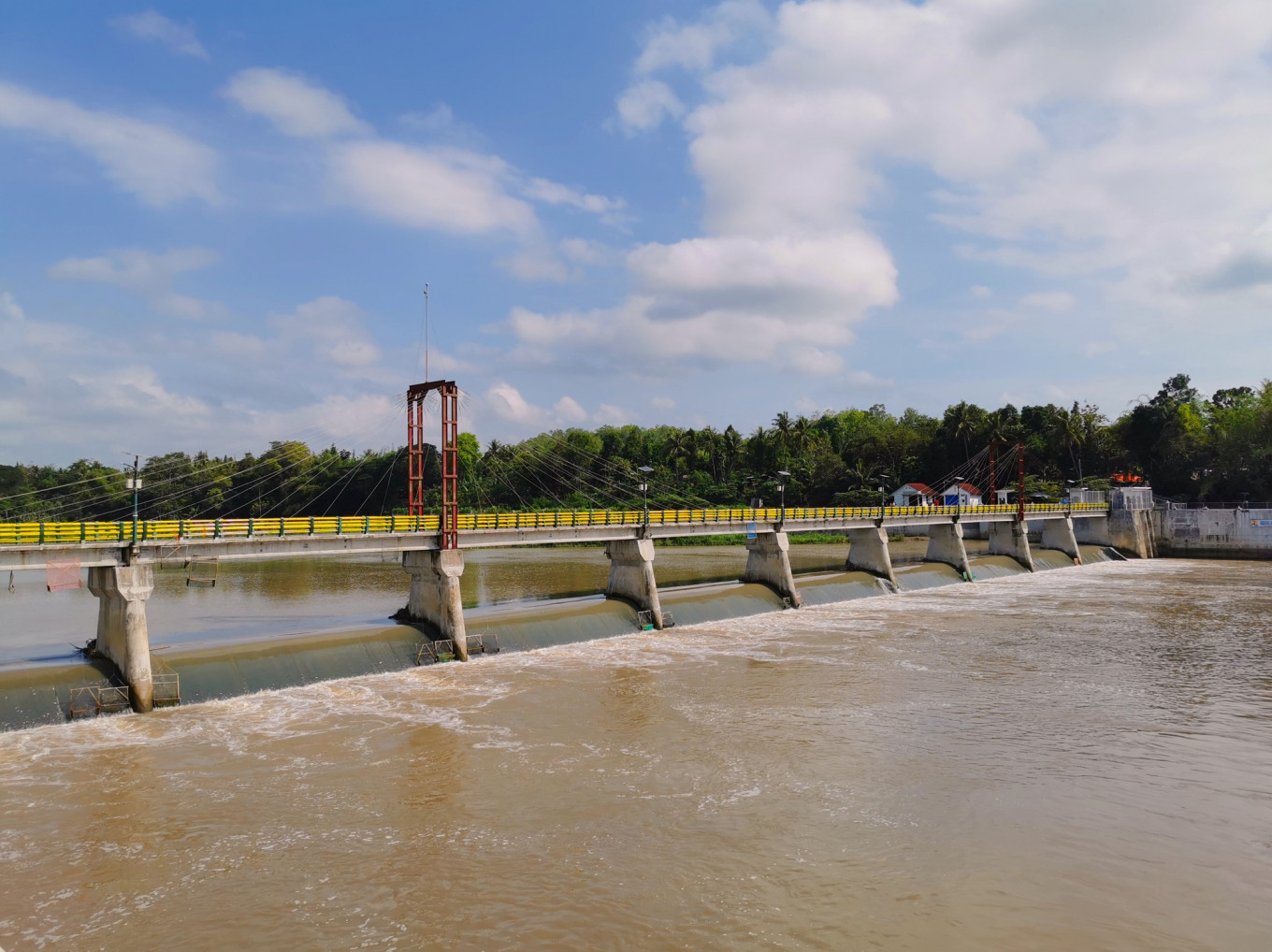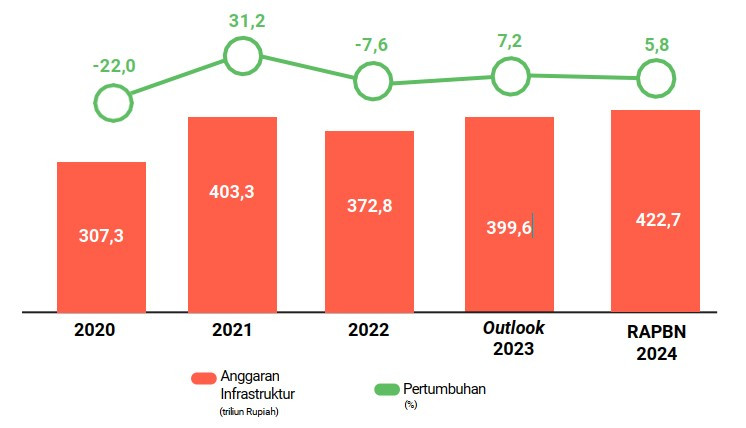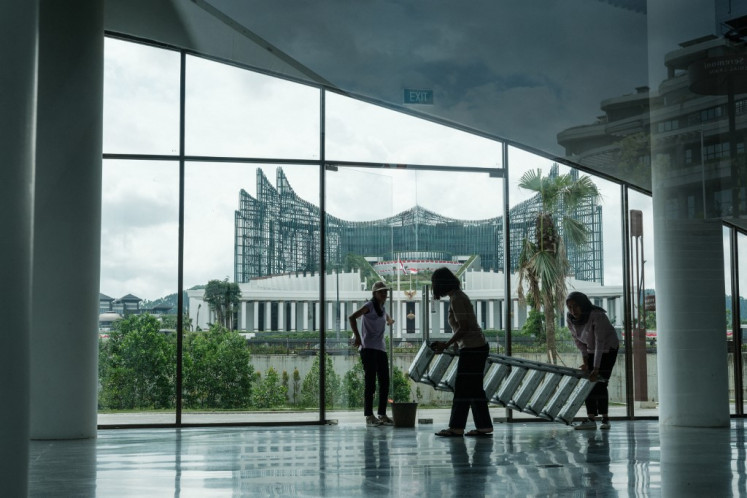Popular Reads
Top Results
Can't find what you're looking for?
View all search resultsPopular Reads
Top Results
Can't find what you're looking for?
View all search resultsEquity and progress: Indonesia's 2024 infrastructure plan
Infrastructure development in Indonesia faces several crucial challenges that need to be addressed to enhance the welfare and productivity of the people.
Change text size
Gift Premium Articles
to Anyone
I
nfrastructure development in Indonesia faces several crucial challenges that need to be addressed to enhance the welfare and productivity of the people. Ensuring basic services involves expanding access to suitable, safe and affordable housing, as well as providing quality drinking water and sanitation, which are fundamental for ensuring a healthy and productive life for the community.
Challenges in energy and electricity infrastructure involve significant obstacles, marked by suboptimal access, energy supply and equitable and sustainable electricity distribution. Serious efforts are needed to develop new renewable energy resources (EBT) and utilize environmentally friendly energy (green energy) to meet energy needs while preserving the environment.
Land acquisition constraints for National Strategic Projects (PSN) and other Priority Programs add complexity in ensuring adequate land availability for infrastructure development. Resolving land-related issues will be key to accelerating the completion of priority and strategic projects that can drive economic growth.
In the connectivity and transportation infrastructure sector, challenges focus on accelerating the improvement of regional road connectivity and toll roads. This includes developing an integrated national road network involving airport capacity enhancements, port facilities, maritime transport services and railway infrastructure. All these are designed to connect regions, support the National Tourism Strategic Areas (KSPN) and optimize the potential of Indonesia's Special Economic Zones (KEK) and the development of the National Capital Integrated Coastal Area (IKN).
In the digital era, Information and Communication Technology (ICT) infrastructure is crucial but faces several hurdles. Complete digital infrastructure and ICT are yet to be fully experienced by the population, especially in remote, outermost and disadvantaged (3TP) areas. Hence, optimizing digital services supporting the digital economy, public service stability and electronic governance is necessary to ensure equitable benefits across Indonesia.
Direction of Indonesia's infrastructure development policy 2024
In response to these challenges, the policy direction is clearly defined. Firstly, emphasis is placed on accelerating the development of economy-driving infrastructure, especially in connectivity and transportation, energy and electricity and meeting agricultural infrastructure needs to support food security. Secondly, priority is given to providing basic service infrastructure and strategic projects that support development priorities to ensure a healthy and productive life for the community.
Thirdly, supporting the gradual and sustainable completion of the Nusantara capital city (IKN) development is a primary goal for equitable development driving economic growth. Fourth, equitable and strengthened access to Information and Communication Technology (ICT) supporting digital transformation also receives serious attention. This is done to reduce the digital divide and connect everyone digitally, especially in 3T regions, by optimizing digital services supporting the digital economy, public service stability and electronic governance.
Lastly, efforts to empower business participation through the Government and Business Cooperation Scheme (KPBU) are implemented in infrastructure development. Thus, this policy creates a strong foundation for sustainable growth and equitable development across Indonesia. Through the direction set by this infrastructure development policy, the 2024 infrastructure budget is aimed at accelerating and distributing development that supports economic development and basic services.
Budget and infrastructure development output 2024
The allocated funds for infrastructure development in 2024 are strategically utilized to yield concrete output. In the basic services and food sector, the construction of specific and multi-story houses targets 6,032 units, with an additional rehabilitation of 613 primary and secondary education facilities. A Water Supply System (SPAM) with a capacity of 2,270 liters per second will be constructed, along with irrigation networks covering 4,000 hectares and rehabilitating 38,000 ha.
In the field of connectivity and transportation, the budget focuses on constructing new roads spanning 271.2 kilometers, operating toll roads covering 50.8 km, and cumulative railway track construction spanning 7,451 km. The construction of new bridges totaling 4,796.2 meters, along with flyovers, underpasses and tunnels totaling 2,231.1 m, is an integral part of efforts to enhance connectivity. Additionally, investments involve building 21 new airport locations and 36 new ferry ports.
In the energy and electricity sector, the budget is designed to continue projects such as the first-phase construction of natural gas transmission pipes (Cirebon-Semarang section), completing the construction of 16 dams and providing new electricity connections to 80,000 households. Meanwhile, ICT infrastructure is supported by investment in 62 digital broadcast systems, providing new internet access in 30 locations and operating the SATRIA project to provide leased satellite capacity in phases 1 and 2, totaling 29.7 Gbps.
With a detailed and comprehensive budget allocation, it is expected that the outputs from these projects will effectively support economic transformation, create equitable development and enhance the quality of life for people across Indonesia.
Source: The Finance Ministry












